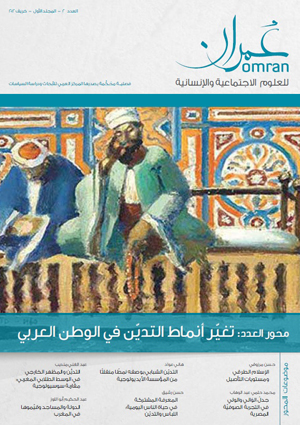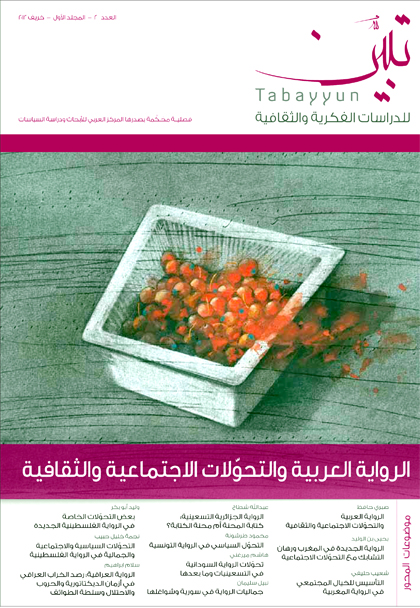The Arab Center for Research and Policy Studies announces the publication of the second issue of its quarterly, peer-reviewed, periodicals: Omran, which specializes in the social sciences and the humanities, and Tabayyun, a journal dedicated to cultural studies. The main theme of the second issue of Omran, "changing patterns of religiosity in the Arab world," contributes to the academic study of religiosity understood as a social practice that is influenced by both internal and external factors. The second issue of Tabayyun features a special dossier on the Arab novel in relation to social and cultural transformations, providing a scholarly contribution aiming at enriching the Arab literary debate.
A Fresh Perspective on Religiosity
The contributions of Arab academics and researchers in the dossier found in Omran (No. 2, Fall 2012) represent an attempt to rethink religious practice in Arab societies. The preface to the dossier calls for a rereading of the changes that have affected all forms of religious behavior in Arab societies, arguing that "changes in patterns of religious practice are not necessarily the result of an endogenous change in habits; in fact, such shifts are often the reflection of influences stemming from outside the local environment of the subject".
 The contributions in this dossier include a study by Tunisian researcher Hasan Marzuqi, entitled "Sufi Islam and Levels of Authentication". Marzuqi examines the manner in which the Sufi model of religiosity has thrived in Tunisia during the past two decades, despite the frenetic modernization of Tunisian society and the attendant fragmentation of traditional structures. Egyptian researcher Muhammad Helmi Abd al-Wahhab continues the debate, explaining the distinctive role played by Sufi communities, in his study "The Dialectic of the Master and the Disciple in the Egyptian Sufi Experience". Palestinian researcher Hani Awwad discusses the phenomenon of "Religiosity among the Youth: A phenomenon independent of the Ideological Establishment". Moroccan researcher Hasan Rasheeq speaks of the relationship between dress codes and religiosity in a study entitled "Shared Knowledge in the Daily Lives of People". Finally, Moroccan sociologist Abd al-Ghani Mandeeb presents a survey-based study, entitled "Religiosity and Outward Appearance in the Moroccan Student Community: A Sociological Approach".
The contributions in this dossier include a study by Tunisian researcher Hasan Marzuqi, entitled "Sufi Islam and Levels of Authentication". Marzuqi examines the manner in which the Sufi model of religiosity has thrived in Tunisia during the past two decades, despite the frenetic modernization of Tunisian society and the attendant fragmentation of traditional structures. Egyptian researcher Muhammad Helmi Abd al-Wahhab continues the debate, explaining the distinctive role played by Sufi communities, in his study "The Dialectic of the Master and the Disciple in the Egyptian Sufi Experience". Palestinian researcher Hani Awwad discusses the phenomenon of "Religiosity among the Youth: A phenomenon independent of the Ideological Establishment". Moroccan researcher Hasan Rasheeq speaks of the relationship between dress codes and religiosity in a study entitled "Shared Knowledge in the Daily Lives of People". Finally, Moroccan sociologist Abd al-Ghani Mandeeb presents a survey-based study, entitled "Religiosity and Outward Appearance in the Moroccan Student Community: A Sociological Approach".
Other studies featured in the Fall issue of Omran include "The Political Manifestation of Death in Sudan: A Reading in Destiny and Providence" by Husam al-Deen Salih; "Observations on the Teaching of Economics Based on Academic Experience" by Ali Abd al-Qadir Ali; and a study by Salah al-Zaru al-Tamimi entitled "Restricted Development: Development Policies in Palestine and their Effect on Employment Opportunities".
Additionally, Omran offers a variety of new articles and book reviews, including an article by Tunisian sociologist Adil Belhaj Rahuma: "Salafists and the Tunisian Revolution: Identity and Citizenship"; a review of the recently-published book, The Quest: Energy, Security, and the Remaking of the Modern World; and a translation of a study by Turkish anthropologist Niluler Gole, "The Forbidden Modern: Civilization and Veiling," an indispensable text for researchers interested in the phenomenon of religiosity in the public sphere.
The Arab Novel in Relation to Social and Cultural Transformations
The second issue (Fall 2012) of Tabayyun focuses on the theme of the Arab novel in relation to social and cultural transformations. The studies and papers featured in this issue attempt to approach the transformations witnessed by Arab literary experience in its social and cultural dimensions. The preparation of the dossier was supervised by critic and academic Sabri Hafiz, who wrote in the introduction: "the combined studies in this dossier show that the Arab novel did not stop at depicting Arab reality, it also performed one of the primary roles of the intellectual: maintaining critical faculties alive, exposing attempts to hide and suppress truth, unmasking reality as it truly is, preventing half-truths from establishing their credibility, maintaining a state of permanent vigilance toward ongoing events, and exposing the hidden meanings in these events. [The Arab novelistic text] has performed these functions without forgetting itself, ignoring its textuality, or neglecting the important dialectic between the textual strategies and the process of writing on the one hand, and the other processes that take place simultaneously, interacting with the process of writing, on the other".
 In the dossier, Yahya Ben al-Waleed writes on "The New Novel in Morocco and the Wager of Confluence with Social Transformations," while Shuaib Halifi focuses on "The Construction of Societal Imagery in the Moroccan Novel". Abdallah Shattah presents a study entitled "The Algerian Novel during the Nineties: Writing Tragedy or the Tragedy of Writing?", and Muhammad Tarshuna discusses "Political Transformation in the Tunisian Novel". Hashim Mirghani, meanwhile, writes on "The Transformations of the Sudanese Novel in the Nineties and Beyond," and Nabil Suleiman on "The Aesthetics and Concerns of the Syrian Novel". Waleed Abu Bakr contributes his reflections on "Some Specific Transformations in the New Palestinian Novels" while Najma Khalil Habib focuses on "The Political, Social, and Aesthetic Transformations in the Palestinian Novel on the Eve of the Twenty-First Century". Finally, Salam Ibrahim writes on "The Iraqi Novel: Recording the Iraqi Desolation in Times of Dictatorship, Wars, Occupation, and the Hegemony of Sects".
In the dossier, Yahya Ben al-Waleed writes on "The New Novel in Morocco and the Wager of Confluence with Social Transformations," while Shuaib Halifi focuses on "The Construction of Societal Imagery in the Moroccan Novel". Abdallah Shattah presents a study entitled "The Algerian Novel during the Nineties: Writing Tragedy or the Tragedy of Writing?", and Muhammad Tarshuna discusses "Political Transformation in the Tunisian Novel". Hashim Mirghani, meanwhile, writes on "The Transformations of the Sudanese Novel in the Nineties and Beyond," and Nabil Suleiman on "The Aesthetics and Concerns of the Syrian Novel". Waleed Abu Bakr contributes his reflections on "Some Specific Transformations in the New Palestinian Novels" while Najma Khalil Habib focuses on "The Political, Social, and Aesthetic Transformations in the Palestinian Novel on the Eve of the Twenty-First Century". Finally, Salam Ibrahim writes on "The Iraqi Novel: Recording the Iraqi Desolation in Times of Dictatorship, Wars, Occupation, and the Hegemony of Sects".
In addition to the dossier, the Fall issue of Tabayyun includes studies, such as the essay by Mushir Bassil Aoun on the fate of philosophy in the Arab World, the study of Abd al-Hamid Hanyia on the experience of research within the Dirasat Magharibiya journal, and the contribution of Muhammad al-Sheikh on "The Teaching of Philosophy in Moroccan Colleges".
Furthermore, the quarterly offers a translation of and an introduction to the work of Franco Moretti by the journal's editor-in-chief Thaer Deeb under the title "The Novel: History and Theory".
Tabayyun also offers its readers a variety of new texts and reviews, including an interview with Syrian novelist Fawwaz Haddad, "Reality First," and a review of the book Politics, Law, and Society in Islamic Thought: The Ibn Taimiya Moment.
In a report featured in the issue, Abd al-Raheem Abu Husain writes on the proceedings of the honorary symposium that discussed the life and works of historian Kamal Salibi at the American University of Beirut last May.
The second issues of Tabayyun and Omran will be available in the coming days and distributed in the region by the Arab Center for Research and Policy Studies. To view the network of distributors, click here.
To obtain copies of these journals and other ACRPS publications, please visit the ACRPS Digital Bookstore (site in Arabic).